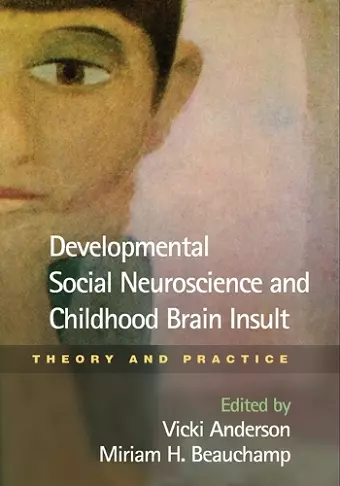Developmental Social Neuroscience and Childhood Brain Insult
Theory and Practice
Vicki Anderson editor Miriam H Beauchamp editor
Format:Hardback
Publisher:Guilford Publications
Published:14th Aug '12
Currently unavailable, and unfortunately no date known when it will be back

Synthesizing cutting-edge knowledge from multiple disciplines, this book explores the impact of acquired brain injury and developmental disabilities on children's emerging social skills. The editors present an innovative framework for understanding how brain processes interact with social development in both typically developing children and clinical populations. Key issues in assessment are addressed, including ways to measure both social function and brain function using developmentally sound tools. Balancing theoretical and clinical concerns, the book describes promising interventions for promoting children's adjustment and helping them participate more fully in the social world. Illustrations include six color plates.
Among the most common and devastating effects of early brain insult are impairments in social perception and cognition. However, the literature on this topic remains scattered and fragmentary. Finally, we have a volume that brings together research on different disorders and from multiple disciplines, within a single, coherent theoretical framework. I highly recommend this book for clinicians, instructors, students, and scientists alike.--Mark H. Johnson, PhD, Professor and Director, Centre for Brain and Cognitive Development, Birkbeck College, University of London, United Kingdom
This informative, innovative volume proposes a framework for understanding how social skills typically develop and why children with brain disorders often have problems in this area. The book addresses both theoretical and practical considerations in conceptualizing and measuring social skills disturbances in children and providing rehabilitative interventions. The developmental social neuroscience perspective introduced here will be valuable for anyone involved in neuropsychological rehabilitation of children with brain disorders.--George P. Prigatano, PhD, Newsome Chair, Department of Clinical Neuropsychology, Barrow Neurological Institute
The editors have put together an authoritative volume at the expanding edge of the exciting new field of developmental social neuroscience. Grounded in Anderson and Beauchamp’s comprehensive theory of the neural, cognitive, and environmental predictors of social skills, the chapters skillfully weave together theory and empirical research on the social consequences of childhood brain insult, with a strong emphasis on assessment and intervention. This fresh, thought-provoking volume will inform my own work and is a terrific resource for researchers, educators, clinicians, and graduate students seeking to integrate neuroscience and social development.--Stephanie M. Carlson, PhD, Institute of Child Development, University of Minnesota
-“I strongly recommend Developmental Social Neuroscience and Childhood Brain Insult. As I began reading the book, I was pleasantly surprised to find that I was quickly immersed in a theoretical treatise on the very nature of what it means to be social, and how that can go wrong in an entire constellation of ways….A ‘must have’ book for any practicing child neuropsychologist, and I foresee returning to reread various chapters in the near future. The book could also form the syllabus for a fascinating course at a graduate level and will undoubtedly stimulate an explosion of new research seeking to clarify the model.”--Child Neuropsychology, 4/11/2014
Among the most common and devastating effects of early brain insult are impairments in social perception and cognition. However, the literature on this topic remains scattered and fragmentary. Finally, we have a volume that brings together research on different disorders and from multiple disciplines, within a single, coherent theoretical framework. I highly recommend this book for clinicians, instructors, students, and scientists alike.--Mark H. Johnson, PhD, Professor and Director, Centre for Brain and Cognitive Development, Birkbeck College, University of London, United Kingdom
This informative, innovative volume proposes a framework for understanding how social skills typically develop and why children with brain disorders often have problems in this area. The book addresses both theoretical and practical considerations in conceptualizing and measuring social skills disturbances in children and providing rehabilitative interventions. The developmental social neuroscience perspective introduced here will be valuable for anyone involved in neuropsychological rehabilitation of children with brain disorders.--George P. Prigatano, PhD, Newsome Chair, Department of Clinical Neuropsychology, Barrow Neurological Institute
The editors have put together an authoritative volume at the expanding edge of the exciting new field of developmental social neuroscience. Grounded in Anderson and Beauchamp’s comprehensive theory of the neural, cognitive, and environmental predictors of social skills, the chapters skillfully weave together theory and empirical research on the social consequences of childhood brain insult, with a strong emphasis on assessment and intervention. This fresh, thought-provoking volume will inform my own work and is a terrific resource for researchers, educators, clinicians, and graduate students seeking to integrate neuroscience and social development.--Stephanie M. Carlson, PhD, Institute of Child Development, University of Minnesota
- “I strongly recommend Developmental Social Neuroscience and Childhood Brain Insult. As I began reading the book, I was pleasantly surprised to find that I was quickly immersed in a theoretical treatise on the very nature of what it means to be social, and how that can go wrong in an entire constellation of ways….A ‘must have’ book for any practicing child neuropsychologist, and I foresee returning to reread various chapters in the near future. The book could also form the syllabus for a fascinating course at a graduate level and will undoubtedly stimulate an explosion of new research seeking to clarify the model.â€--Child Neuropsychology, 4/11/2014
ISBN: 9781462504299
Dimensions: unknown
Weight: 926g
398 pages